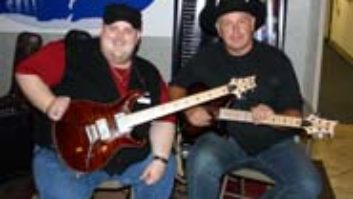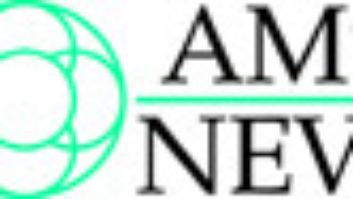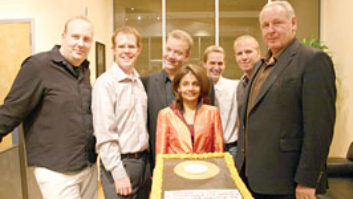Let’s be blunt: In the American audio education world, Tom Misner is viewed as the Big Bad Wolf – the outsider intent on blowing away the competition as he methodically builds an empire of SAE Institute of Technology schools around the world. Success does sometimes breed contempt, and Misner has been very successful: There are currently 30 SAE schools teaching more than 12,000 students in such far-flung ports-of-call as London, Paris, Sydney, Munich, Singapore, Stockholm, Kuala Lumpur, Athens, Madras and several other locales. What frightens other U.S. recording programs – and this has become a very competitive business – is Misner’s plans to set up shop across the United States. So far, there are two SAE schools here – in New York and Nashville – and Misner says he hopes to eventually have a dozen dotting the American landscape. Misner claims a fortune of about $900 million (he made most of his money in real estate), so SAE programs don’t have to worry much about capitalization, and one imagines that the organization could expand at will. Former SAE students already populate hundreds of studios worldwide, though so far their inroads in the U.S. have been modest.
Misner isn’t just some rich businessman dabbling in audio. He’s a working engineer, producer and studio designer with some 30 years experience in the field. In the mid-’70s, he built SAE up from nothing, opening his first school in Sydney (though Austrian by birth, he moved to Australia when he was 14), then eventually expanding to London, Munich and beyond. He builds studios on property he owns, and he fills them with gear that he gets at good prices, because he is certainly one of, if not the, largest single purchaser of audio equipment in the world. Though his home base is Sydney, where he owns much real estate, including 301 Studios, a multimillion-dollar multimedia facility, he considers himself a citizen of the world; indeed, it seems as though he’s been traveling almost constantly for much of the last three decades. Appropriately for a man of the world, he has an accent that is part German, part Australian with a few American- and British-isms thrown in.
We spoke by phone – Sydney to Oakland – during the summer.
Tell me a little about your own education in recording. Were you technically inclined as a youth?
Not at all, no. I was a musician. I was always playing guitar. I had much more music training than technical training. I guess you’d say my education in recording was the traditional route. I was a tea-boy and did things like painting the studio and being a general assistant of nothing, which is one reason I gave up on engineering initially.
I left it, because I thought, “I’m painting walls. This is ridiculous.” So I went and joined the major television here in Sydney, which is Channel 9. I came from Germany and obviously had a pretty heavy German accent, and when I went to Channel 9, and they asked me what I knew about television, I said I have some experience in television. They gave me a test about a week after my initial appointment. And during that week, I bought myself a book about TV, a little handbook that explained what a cathode ray tube was and all that, and then I went in and took this multiple-choice test, and I passed quite well and ended up being a technician grade A, which was a very good position.
I worked there for about eight months, and during part of that time, I used to drive past the record company in Australia called Festival Records, and one day I decided to walk in there and see if they had any jobs. They said, “What are you doing now?” And I said, “I work for Channel 9,” which was like working for NBC or something. So they said, “We’ve installed this new console called a Neve. Have you seen it before?” I said, “Oh yes, yes, yes.” At Channel 9 we had a Neve that was like a 6-channel into two. So they showed me this new Neve, and it was this 30- or 40-channel monster; it was the biggest thing I’d seen in my life. But they gave me a job, virtually on the spot. I had one month to get my act together, and I was working with other people there, assisting, and then I started engineering, without the knowledge of what a compressor is, what any of those things were. From then on, I progressed the traditional way.
Did you have anyone shepherding you?
No, because the other engineers assumed I knew all about things. I wasn’t going to ask them what a compressor was!
You were living a lie!
[Laughs] I was living a lie. But I learned quickly, and I started mixing some bands; luckily, most of the bands didn’t know much more, either. We’re talking 1970 here. From there, I left Australia, because I had a job offer back in Germany. Then I went to England, and my traveling started.
Were there engineers or producers in England you looked up to?
Yes. I always looked up to Alan Parsons, who was just five or six years older than me; he was around my age. I also used to read RE/P, Recording Engineer and Producer, which was a very good magazine then; it was great for me. Actually, you might not know that I did an interview with Mix when it was still a newspaper.
From then on my education was basically practical, doing a lot of engineering and a lot of mixing. To cut a long story short, it ended with me last year earning a doctorate from Middlesex University. So now I have a Ph.D., which was based on my work in both education and acoustics.
When you were moving around as you did, going from Australia to Germany to England and America, is there anything you learned then that set you on a path that made you think you could teach this?
Everywhere I went I picked up little things. One place I’d learn about how someone used a compressor. At another it might be miking techniques. But more importantly, all that traveling taught me how to deal with people. That was the key. It’s a people business. It taught me a lot about communication. The Germans would talk to me differently than the British or the Americans would talk to me. The Americans were always looking for the shortest way from point A to point B. The English tend to talk around things a bit.
How did SAE actually get its start?
Well, at one point, I was feeling a little burned out from working in studios for so long, and I thought about it, and I decided that there was a shortage of real information about audio anywhere in the world. So I thought it would be a good idea to try to put together a practical course about it. I had no business experience whatsoever, but I thought I’d teach a few people and that maybe I’d do it a couple of times, teaching maybe ten or 20 people, and then I’d go back to the studio. So that’s how SAE started – more or less as a sideline before I went back to work.
Basically, I taught what I’d picked up. At first, I thought the course would be about six months long, but after less than three months, I’d taught everything I knew, because I had no idea about speed or time. [Laughs.] So then I started to get friends in to teach more about electronics and things of that nature, which wasn’t part of my original plan. It took the better part of a few years to really sort out the curriculum, because with SAE it’s never been only what we teach – yes, we teach you about microphones and speakers and consoles like everyone else – but it’s the order in which we teach it and how it all fits together.
How important is it to be up to date?
Totally. I think that’s one of the strengths of SAE.
But isn’t the basis of so much of the knowledge unchanging? The theoretical constructs underlying a lot of the material? I mean a compressor is still a compressor.
That’s true, but that sort of material probably only represents about half the course, and the other half does change. Look at how different it is than just a few years ago. So many people now, for instance, are Pro Tools-oriented, which is a different way of working. It’s still a multitrack, but it’s a different way of working. So things do change, and being the owner of the company and still being totally involved in engineering, I’m on the edge of it all the time.
When did it become clear to you that this could become a successful business for you, as well as a valuable tool for others?
Not for five or six years. In the beginning, it wasn’t a successful business. I needed money from my mother, I needed money from everywhere to keep going the first five or six years. The growth was not that planned out really. Someone said one day, “How come there’s no school in Melbourne,” so I went down there to check it out, and I started a school there without thinking too much about the consequences of it. SAE never had a business plan, because the banks didn’t understand what we were doing; they didn’t know why there should be a school for audio engineering. And the banks could never find an example of another school. “How come you’re the only one doing it? It can’t be a good idea if no one’s done it before.”
Did you look at other programs in the U.S. or England?
There weren’t any, really; or not that I was aware of. The only one I had heard of really was the College of Recording Arts. I got some information from them, but they were more classically oriented and more electronics oriented. There was also a German program that was a four-year program.
How has the program evolved? How do you bring in new technologies?
We have a meeting every year. I wrote all the curriculums for the first 15 years, and they were week-by-week subjects that I’d send to my schools. And we’d have meetings. Initially, I was changing the length of the courses from six months to nine to 12 to 15 to 18; it went different directions for a while. Until for the last 10 years or so we stabilized at one year. Then I would change subjects within the course – so we might have been teaching more on, say, valve technology for a while. But as the years have passed, that was reduced to not teaching it at all really beyond saying that it exists and having some examples to look at. But we constantly readjust and realign the topics. You have to.
What are your observations about students through the years? It seems musicians, in general, know more about technology than they used to. Is there still a certain type of person who will be successful in this field and a certain type who won’t?
Yes. It comes back to personalities. If a student finishes the course, and they have the attitude, “I’ve got an education now, here I am,” and they’re maybe a little arrogant about it, they aren’t necessarily the ones who will have the best success, because it’s still a people business. You do need a certain amount of confidence, combined with knowledge and a certain personality. You have to know how to work with people, not just machines. Some people know everything but they fail, because they have no communication skills.
Do people going into the schools still view engineering as a glamorous profession?
Some do, but we shoot that down pretty quickly. [Laughs.] Unfortunately, some schools are still marketing that way. That doesn’t work in Europe; it works a little more in the States. Most people, of course, don’t go from school to working sessions with superstars. It does happen, but no one should have any illusions about it.
Another observation is that in Australia and Germany, when students used to do a course, if they got a job a lot of times they wouldn’t admit that they’d gone to SAE, because it wasn’t cool to have gone to school to learn this. You’re supposed to have been born with this talent, I guess. Interestingly enough, in the past ten years, the picture has changed in those countries. Now, if you’ve learned at SAE, it’s a big plus for you. In Germany, the number of students who are working is phenomenal. We have former students at literally every TV station, most recording studios.
Do the school programs differ much from country to country?
It’s probably 80 percent the same everywhere, but the other 20 percent is always adjusted to the market it’s in. For example, in India, we’re obviously teaching a lot of film sound, because the film market is so huge; far more than we’re teaching it in New York. In Germany, we’re teaching synchronization a little more, because they dub all the movies there. So we react to the market.
Are the students similar from country to country?
They are, with the exception of the first group of students at each school, who, interestingly, have been on the average more successful as a group than ones who have followed them.
Maybe they were waiting for the school to open, and they’re more eager.
Maybe. I’m not sure what it is.
You’ve had a few problems getting going in the United States.
Things are done differently in the U.S. The problem there is that certification is designed state by state. There’s no federal accreditation. Everything takes a little longer it seems. My target is to eventually have a dozen schools in the U.S.
How important is hands-on training?
Some schools have impressive facilities of their own, others make arrangements with studios in town…
If you work with other studios it usually doesn’t work, because you don’t get the time, and you’ll never be their primary customer. To me, hands-on is everything, because I can talk to you about compressors and compression, and you’re looking at me going, “Yeah, yeah.” But until you’ve actually worked with a compressor, you won’t fully understand it. So I place huge emphasis on the practical aspects. We guarantee our students lots of time in the studio. Not just once or twice, but all during the program in various different stages.
That’s where the size of SAE matters, because we’re able to have more purchasing power, and we get better prices for things. We place a very high value on studio time, and that’s also helped by the fact that we usually only have about 250 students in a location, whereas some other schools have many more.
Do you make deals with certain manufacturers to get equipment, and does that then unfairly influence people to go in a certain direction with their technological skills?
Yes and no. We make deals with many manufacturers. For instance, we have a deal with AKG, and we will have AKG microphones and maybe a few less Neumanns, but the students are never told that AKG is the best or whatever. The students are smart. They know that. At the same time, the manufacturers know that the exposure is good for them. We might have an arrangement with Mackie for digital consoles or the Mackie multitracks, but the students are still told about Yamaha 02Rs, for example. Will students later want to buy a piece of equipment they know better? Possibly. That makes sense, and that’s part of the manufacturer’s benefit for entering into deals with us.
So I imagine you haven’t had much trouble finding manufacturers wanting to get involved with SAE…
Well, it’s been half and half. Some manufacturers see the value in it and others not at all. It’s fairly black and white. I couldn’t really tell you why those companies don’t see the value at all.
Where’s the most surprising place that SAE is that Americans might not know about?
Probably India. I didn’t look at India initially, but it’s a billion people now, and 10 percent of them are extremely wealthy or middle class, which is something like a hundred million people. They have a huge, self-contained entertainment industry.
What’s interesting, though, is that Indians have traditionally loved overseas education, so you see a lot of them going to England, Australia and America for the degree parts of their programs.
Where’s the place you would most like to have a school that you don’t currently?
L.A. But that’s coming. In Europe, the one we don’t have yet is Brussels, which is a major center for hip hop and dance music.
It must be exciting to sort of be populating the world’s studios. It’s a good legacy to have.
Yes, it is. The last few years my other business interests, such as real estate investments, have overtaken SAE, but this is still where my heart is. I love the studio. I just finished producing two records [at 301 Studios in Sydney] that are just coming out, one artist called Grace Knight and the other is a country-rock act, Tina Martyn. I engineered, mixed and produced those.
What do you do to keep your own chops up and keep up with technology? Do you go to AES shows?
Yes, I go to AES shows, and I travel a lot and visit studios all the time. I consider myself very much a global citizen, and I try to take the best from everywhere. I talk to engineers. And 301 has been a great avenue for staying on top of things.
For some reason, there’s a perception out there that SAE is a giant monolith that’s trying to take over the world. It might be Americans’ suspicions about chain operations in general…
Well, we’re providing a service, and whoever provides the best service, wins. That’s really the bottom line. We are aggressive in terms of our marketing and our strategies, but there’s no great plan for world domination or anything. But what we’re doing works, and I know we provide a better product than most. There’s no such thing as “the best” product in this field, because it all depends on what you’re looking for as a potential student, a potential customer. I always look at my students as customers. Some schools have the attitude, “You are lucky you’re allowed to be here.” To me, a student is a customer that’s got to walk away happy with an education. Fifty percent of our students come because it was recommended by other students, so we must be doing something right.




